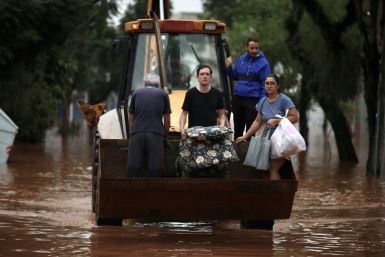Gold Mine vs. Old Mine in Transylvania
IDLE MINE: Rosia Montana is located in the Apuseni Mountains of western Transylvania, where gold mining is embedded in local history but now may also threaten it. (Photo: ZUMA Press)
Rosia Montana is no stranger to mining. In fact, the rural town in Transylvania has been coughing up precious metals for millennia: It's home to Romania's oldest-known mining settlement, where the Roman Empire mined gold nearly 2,000 years ago, and it has since enriched rulers from the Austrian Empire to Soviet-era communists.
But in recent years, Rosia Montana has become stuck in an ironic controversy. A proposed gold mine could bring jobs and riches to the area, proponents say, but could also wipe out what remains of its celebrated history - including its ancient Roman mining tunnels. Critics say the mine would destroy a wide range of relics, on top of endangering people and wildlife with cyanide-laced tailings stored behind a 590-foot-tall dam.
This controversy has been simmering for years, with a Canadian company pushing for the right to mine Rosia Montana's vast gold and silver reserves, thought to be the largest in Europe. A coalition of local residents, scholars, environmentalists and others has kept the miners at bay, but now - as gold and silver prices soar to record highs - the return of mining to Rosia Montana may be gaining momentum.
"It is in Romania's interest that the mining of the gold begins as rapidly as possible," Romanian President Traian Basescu said last week, as quoted in Der Spiegel. Basescu dug in even further this week, telling the Associated Press on Monday that "any country that has resources must use them," and lamenting that the project "has been buried since 1997" due to political cowardice.
Basescu's words must be music to the ears of Rosia Montana Gold Corp., which is 80 percent owned by Canada-based Gabriel Resources and 20 percent by Romania. The company has been salivating over Rosia Montana's gold for more than a decade, but local opposition has stood in the way. As McClatchy Newspapers reported this week, "The saving of Rosia Montana has become the cause celebre of Romanian civil society." Polls reportedly show a majority of Romanians don't want the mine.
"Nature is the most precious thing left in Romania. That's why people are fighting so hard against the mining project. It's a patriotic impulse," one activist tells McClatchy. Aside from ecology, many mine critics are also motivated by the area's history. "We are losing unique archaeological monuments," says the head of the National Museum of Transylvanian History. "I'm not against mining in general - my father was a mining engineer - but the destruction of Rosia Montana is a crime from all points of view."
In response, Rosia Montana Gold Corp. has made efforts to reassure Romanians it won't completely destroy Rosia Montana. The company has spent $10 million on its own archaeological program, with $35 million more planned, and has pledged to protect the main historic buildings within the mining campus. (One of the ancient Roman tunnels will also be saved.) And to address environmental concerns, the company says it will use only the safest cyanide technologies for gold leaching.
Perhaps its biggest sales pitch isn't about what it will keep, but what it will bring: 800 jobs, $1.8 billion in direct benefits and $2.2 billion in indirect benefits. Just in case all that still isn't enough, the company also helped fund a 2007 documentary, "Mine Your Own Business," that portrays opponents of the mine as foreign meddlers willing to block Romania's economic growth. "Before, the environmentalists would lob mortars at us and we would keep our heads down," said Alan Hill, president of Gabriel Resources, when the film was released. "Now there is a big push back."
Hearts and minds aren't the only things Gabriel Resources and its subsidiary must win, though. As McClatchy reports, Rosia Montana Gold Corp. needs to obtain all land within the proposed industrial zone, and currently owns just 60 percent. Local poverty has helped it convince many homeowners to sell, and the support of Romania's president couldn't hurt the company's land grab. In the meantime, the anti-mine group Alburnus Maior has vowed not to give up, even as residents move out and bodies are exhumed from cemeteries. Scholars in Romania and elsewhere have praised Alburnus Maior's efforts, and a committee of the International Council on Monuments and Sites recently suggested Rosia Montana as a potential UNESCO World Heritage Site. Such a declaration, activists hope, would make it impossible for the mining project to proceed.
"Gold never brought us happiness," the owner of Rosia Montana's only hostel tells McClatchy. "The Romans conquered this land for the gold. The Austro-Hungarians came here for the gold. Then the communists. And now this company. Before they were called invaders, now they are called investors. This is evolution, I guess."
If you aren't up for 20 minutes of subtitles, see the official sites of Alburnus Maior and Rosia Montana Gold Corp., as well as this excellent report by McClatchy Newspapers, which was underwritten by a grant from the Pulitzer Center on Crisis Reporting.
Source: Mother Nature Network






